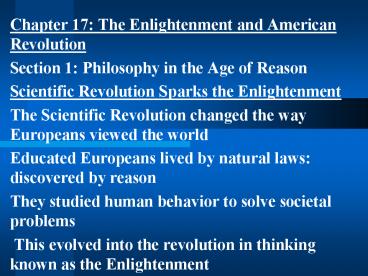Chapter 17: The Enlightenment and American Revolution - PowerPoint PPT Presentation
1 / 13
Title:
Chapter 17: The Enlightenment and American Revolution
Description:
Chapter 17: The Enlightenment and American Revolution Section 1: Philosophy in the Age of Reason Scientific Revolution Sparks the Enlightenment – PowerPoint PPT presentation
Number of Views:917
Avg rating:3.0/5.0
Title: Chapter 17: The Enlightenment and American Revolution
1
- Chapter 17 The Enlightenment and American
Revolution - Section 1 Philosophy in the Age of Reason
- Scientific Revolution Sparks the Enlightenment
- The Scientific Revolution changed the way
Europeans viewed the world - Educated Europeans lived by natural laws
discovered by reason - They studied human behavior to solve societal
problems - This evolved into the revolution in thinking
known as the Enlightenment
2
- Hobbes and Locke have conflicting views
- Both of these men were key Enlightenment thinkers
- Thomas Hobbes believed in a powerful government
to control people in their natural state - He believed in the Social Contract and in an
Absolute Monarchy - In contrast, John Locke believed people were
basically good and had natural rights - Locke rejected Absolute Monarchy and favored
Democracy - He also believed in the right of the people to
overthrow the government if it fails them
3
- His ideas would have an effect on the American
Revolution - The Philosophes
- Some Enlightenment Thinkers applied science to
improve society - They believed that the use of reason could reform
all areas of society - Baron de Montesquieu studied world governments
and was critical of Absolute Monarchs - In his book The Spirit of the Laws, he argues
that the best governments are divided into
different branches - (legislative, executive and judicial)
- Vocab pg 544, 3-5 pg 548
4
- Montesquieu also believed in checks and balances
- The most famous philosophe was Voltaire
- He believed in saying what he thought
- Despite being exiled by the government and the
Church, he defended the principle of free speech - Denis Diderot produced a set of books called the
Encyclopedia - They contained articles by leading thinkers of
the day - They were criticized by the government and the
church
5
- Despite this, the Encyclopedia influenced Europe
and the Americas - Jean-Jacques Rousseau believed that people were
naturally good, but corrupted by society - He believed that government should be freely
elected, but place controls on people (Social
Contract) - Philosophes argued that women had natural rights,
but were limited to home and family - Mary Wollstonecraft wrote A Vindication of the
Rights of Women which argued for the rights of
women
6
- New Economic Thinking
- Economic thinkers were known as physiocrats
- They believed in a natural law of economics
- They were anti mercantilist, and favored laissez
faire - They supported free trade and were opposed to
tariffs - Adam Smith wrote The Wealth of Nations
- He believed that all aspects of the economy were
fueled by supply and demand - He believed in Laissez Faire but believed in
strong governments to protect the citizens - Vocab pg 550
7
- Section 2 Enlightenment Ideas Spread
- Enlightenment thinkers found traditional beliefs
flawed - The Challenge of New Ideas
- All levels of society accepted Enlightenment
ideas - Middle-class men met in coffeehouses to discuss
new ideas - People began to challenge old ways and wanted to
achieve a just society - Pre-enlightenment thinking included
- divine right rule
- strict class system
- heavenly reward for earthly suffering
8
- Post Enlightenment thinking included
- material well being
- social justice
- happiness in this world
- Enlightenment thinking alarmed both the Church
and the government who believed the old system
was put there by God - They began a policy of censorship
- Despite this Enlightenment writers found ways to
get published - Enlightenment thinkers gathered in salons to
share their ideas - Salons became places where even women could share
ideas
9
- Enlightened Despots
- Enlightened Despots were absolute rulers who used
their power to bring about political and social
change - Some of these rulers included
- Frederick the Great
- Catherine the Great
- Joseph II
- Despite their reforms, these rulers, except
Joseph, maintained absolute power - The Arts and Literature
- Like the rest of society, artists adapted to
changing times
10
- Changes in art, music and literature all
reflected the changing mood of society and were
opened up to all members of society - Lives of the Majority
- In western Europe peasant life improved during
the Enlightenment - Despite some change, some serfdom survived
- 3-6 pg 555
11
- Section 3 Birth of the American Republic
- Britain Becomes a Global Power
- Several reasons Britain was a global force
- -location
- -climate
- -most dominate country in Europe
- -offered free trade with few restrictions
- King George III re-affirmed royal power and gave
seats in parliament to friends - The Colonies in the Mid 1700s
- The colonies were very prosperous for Britain
- They were beginning to develop their own distinct
culture from Britain however
12
- Colonists Express Discontent
- King George III believed the colonists should
help pay for Britain's costly wars - These taxes led to the phrase no taxation
without representation - Tensions began to elevate between the colonists
and Britain - -Boston Massacre
- -Boston Tea Party
- Eventually in 1776 the Colonists declare their
independence from England - The Declaration of Independence contained key
elements from European Enlightenment thinkers
13
- The American Revolution Continues
- Colonists were well outmatched by Britain
- They had some advantages however
- -geography
- -determination
- -Help from France
- Eventually in 1781 the colonists prevail and win
the war - Treaty of Paris officially ends the war
- Britain was forced to recognize the independence
of the United States - Vocab pg 557, 3-6 pg 563































